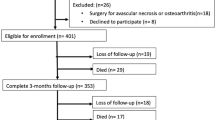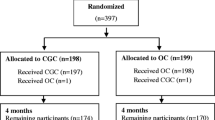Abstract
Background and aims: To evaluate whether and which clinical factors affect the regimen of physical therapy (PT) treatment in elderly patients after hip fracture (HF). Methods: HF patients consecutively admitted to a rehabilitation unit (from January 2002 to May 2004) without adverse clinical events on admission or during hospital stay were considered (n=80). All patients underwent multidimensional assessment including demographic, clinical, cognitive, affective and functional status. Outcome measure was the number of rehabilitative procedures (NRP), computed as the ratio between sum of rehabilitative procedures and length of hospital stay. Results: Patients received 3.8± 1.3 NRP on average, although with large variability. Age and impairment of cognitive and pre-fracture functional status were significantly higher in those receiving fewer NRP. In a multiple regression model, only the Mini Mental State Examination (MMSE) significantly predicted NRP: compared with patients with MMSE ≤ 17, those with MMSE = 18–23, 24–26 and ≥ 27 received 0.3 (95% CI-0.5–1.1, p=0.46), 1.5 (95% CI 0.6–2.4, p=0.001 ), and 1.6 (95% CI 0.7–2.5, p=0.001) more NRP. Conclusions: Cognitive performance affects NRP in elderly HF patients. Specific rehabilitative approaches, according to baseline cognitive performance, should be considered.
Similar content being viewed by others
References
Beelosesky I, Weiss A, Grinblat, et al. Can functional status, after rehabilitation, independently predict long-term mortality of hip-fractured elderly patients? Aging Clin Exp Res 2004; 16: 44–8.
Pautex S, Jacques MC, Sant A, Herrmann F, Chevalley T. A short comprehensive assessment to predict outcome of elderly patients after hip fracture. Aging Clin Exp Res 2005; 17: 116–20.
Wells JL, Seabrook JA, Stolee P, Borrie MJ, Knoefel F. State of the art in geriatric rehabilitation. Part II: Clinical Challenges. Arch Phys Med Rehabil 2003; 84: 898–903.
Ottenbacher KJ, Smith PM, Illig SB, Linn RT, Ostir GV, Granger CV. Trends in lengths of stay, living setting, functional outcome, and mortality following medical rehabilitation. JAMA 2004; 292: 1687–95.
Centers for Medicare & Medicaid Services. Medicare Program: changes to the criteria for being classified as an inpatient rehabilitation facility. 69 Federal Register 89: 25752–76, 2004.
Rossini M, Piscitelli P, Fitto F, et al. Incidenza e costi delle fratture di femore in Italia. Reumatismo 2005; 57: 97–102.
Folstein MF, Folstein SE, Mc Hugh PR. “Mini-Mental State”: a practical method for grading the cognitive state of patients for the clinician. J Psychiatr Res 1975; 12: 189–98.
Sheikh JI, Yesavage JA. Geriatric Depression Scale (GDS): Recent evidence and development of a shorter version. Clinical gerontology: a guide to assessment and intervention. New York: The Harworth Press, 1986: 165–73.
Shah S, Vanclay F, Cooper B. Improving the sensitivity of the Barthel Index for stroke rehabilitation. J Clinical Epidemiology 1989; 42: 703–9.
Matthews LE. Using anthropometric parameters to evaluate nutritional status. J Nutr Elderly 1986; 5: 67–71.
Charlson ME, Pompei P, Ales KL, et al. A new method of classifying prognostic comorbidity in longitudinal studies: development and validation. J Chronic Dis 1987; 40: 373–83.
Handoll HHG, Parker MJ, Sherrington C. Mobilisation strategies after hip fracture surgery in adults (Cochrane Review). In The Cochrane Library, Issue 2, 2004. Chichester, UK: John Wiley & Sons, Ldt.
Bellelli G, Guerini F, De Palma D, et al. Medical comorbidity and complexity of the rehabilitative procedures for elderly patients with functional impairments. J Am Geriatr Soc 2002; 50: 2095–6.
Cameron I, Crotty M, Currie C, et al. Geriatric rehabilitation following fractures in older people: a systematic review. Health Technology Assessment 2000; 4: i–iv, 1–111.
Cameron ID, Handoll HH, Finnegan TP, et al. Co-ordinated multidisciplinary approaches for inpatient rehabilitation of older patients with proximal femoral fractures. Cochrane Database Syst Rev 2001; (3): CD000106.
Jette AM, Harris BA, Cleary PD, et al. Functional recovery after hip fracture. Arch Phys Med Rehabil 1987; 68: 735–40.
Kennie DC, Reid J, Richardson IR, et al. Effectiveness of geriatric rehabilitative care after fractures of proximal femur in elderly women: a randomized clinical trial. BMJ 1988; 297: 1083–6.
Hauer K, Specht N, Schuler M, et al. Intensive physical training in geriatric patients after severe falls and hip surgery. Age Ageing 2002; 31: 49–57.
Mitchell SL, Stott DJ, Martin BJ, et al. Randomised controlled trial of quadriceps training after proximal femoral fracture. Clin Rehabilitation 2001; 15: 282–90.
Baker PA, Evans OM, Lee C. Treadmill gait retraining following fractured neck-of-femur. Arch Phys Med Rehab 1991; 72: 649–52.
Weinrich M, Good DC, Reding M, et al. Timing, intensity, and duration of rehabilitation for hip fracture and stroke: report of a workshop at the National Center for Medical Rehabilitation Research. Neurorehabil Neural Repair 2004; 18: 12–28.
Gruber-Baldini AL, Zimmerman S, Morrison RS, et al. Cognitive impairment in hip fracture patients: timing of detection and longitudinal follow-up. J Am Geriatr Soc 2003; 51: 1227–36.
Lauridsen UB, de la Cour BB, Gottschalck L, et al. Intensive physical therapy after hip fracture. A randomised clinical trial. Dan Med Bull 2002; 49: 70–2.
Penrod JD, Boockvar KS, Litke A, et al. Physical therapy and mobility 2 and 6 months after hip fracture. J Am Geriatr Soc 2004; 52: 1114–20.
Guccione AA, Fagerson TL, Anderson JJ. Regaining functional independence in the acute care setting following hip fracture. Phys Ther 1996; 76: 818–26.
Hoenig H, Rubenstein L, Kahn K. Rehabilitation after hip-fracture — equal opportunities for all? Arch Phys Med Rehab 1996; 77: 58–63.
Lenze EJ, Munin MC, Dew MA, et al. Adverse effects of depression and cognitive impairment on rehabilitation participation and recovery from hip fracture. Int J Geriatr Psychiatry 2004; 19: 472–8.
Rozzini R, Frisoni GB, Ferrucci L, et al. Who are the older patients failing to recover mobility after rehabilitation? J Am Geriatr Soc 1997; 45: 250–2.
Allen SC, Jain M, Ragab S, et al. Acquisition and short-term retention of inhaler techniques require intact executive function in elderly subjects. Age Ageing 2003; 32: 299–302.
Kahokehr A, Siegert RJ, Weatherall M. The frequency of executive cognitive impairment in elderly rehabilitation inpatients. J Geriatr Psychiatry Neurol 2004; 17: 68–72.
Author information
Authors and Affiliations
Corresponding author
Rights and permissions
About this article
Cite this article
Bellelli, G., Frisoni, G.B., Pagani, M. et al. Does cognitive performance affect physical therapy regimen after hip fracture surgery?. Aging Clin Exp Res 19, 119–124 (2007). https://doi.org/10.1007/BF03324677
Received:
Accepted:
Published:
Issue Date:
DOI: https://doi.org/10.1007/BF03324677




